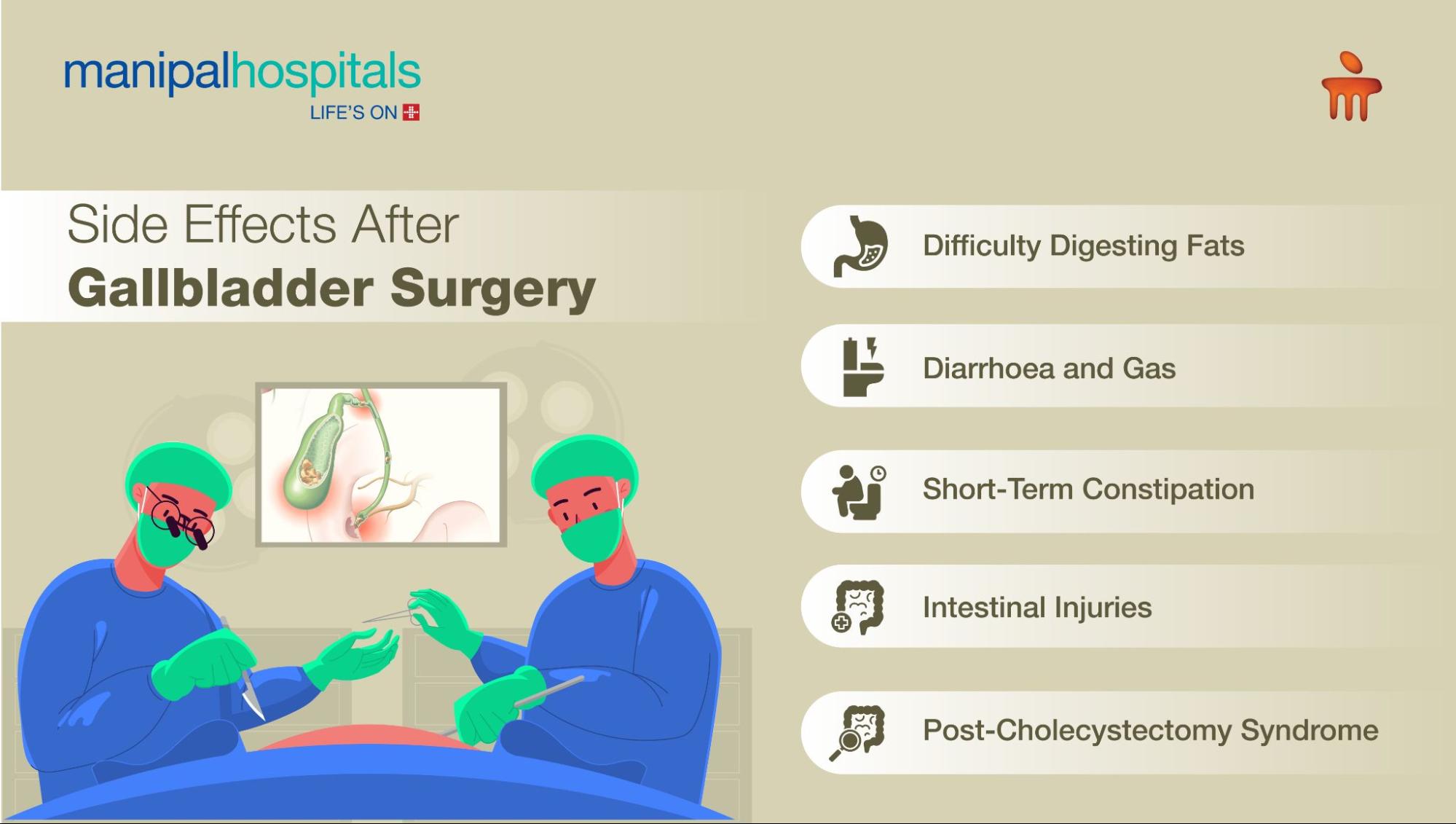Gallbladder surgery, or Cholecystectomy, is a procedure performed to remove your gallbladder. The gallbladder is a small and hollow organ that stores bile to aid food digestion. Gallbladder surgery is performed to treat acute or chronic inflammation of the gallbladder (cholecystitis), gallstones, gallbladder inflammation without gallstones (acalculous cholecystitis), gallstone pancreatitis, and gallbladder cancer. The prevalence of gallstones among adults in India has been recorded at 6.12%.1 India has a high incidence of gallbladder cancer, accounting for approximately 10% of the global burden.2
Although this surgery is relatively simple and you can lead a healthy life without your gallbladder, you may experience some side effects post-surgery. This blog provides detailed information regarding gallbladder surgery and gallbladder removal side effects.
Synopsis
About Gallbladder Surgery
The gallbladder is situated just below the liver on the upper right side of your abdomen. It stores and secretes bile, a digestive fluid that is required to digest fats. Increased bilirubin in the bile or excess cholesterol can lead to various gallbladder conditions, such as gallstones, acute and chronic inflammation of the gallbladder, and stones in the bile duct. The gallbladder surgery, or Cholecystectomy, is a low-risk surgical procedure to remove a diseased gallbladder. Laparoscopic Cholecystectomy is the most commonly performed, less invasive procedure compared to other techniques.
What Happens Before a Gallbladder Surgery?
This surgery is performed using general anaesthesia so that you won’t be awake during this procedure. You must undergo specific blood tests and other health screening tests before the surgery. Your surgeon will advise you to take certain measures before undergoing gallbladder surgery. Some of these include the following:
-
Avoid eating and drinking at least four hours before your procedure.
-
Stop taking certain medications and supplements before the procedure as per your surgeon’s instructions.
-
Take a shower the night before your procedure by using the antiseptic soap instructed by your surgeon.
What Happens During a Gallbladder Surgery?
Your surgeon will choose either Laparoscopic or Open Gallbladder Surgical techniques based on your condition. In the Laparoscopic technique, small incisions are made in your abdomen, and a tube with a tiny video camera is placed in your abdomen through one of the incisions. Then, your surgeon conducts this procedure by watching a video monitor and using surgical tools that are inserted through other incisions. Your incisions are closed after the procedure.
In Open Cholecystectomy, your surgeon does a 6-inch incision on the right side of your abdomen just below the ribs. The tissues and muscles are then moved aside to allow the removal of the gallbladder.
Recovery After Gallbladder Surgery
After the surgery, you will be taken to a recovery area upon waking up from anaesthesia. Your surgeon will prescribe some pain medications. The recovery time may vary depending on the type of surgery conducted. Patients undergoing Laparoscopic Gallbladder Surgery are allowed to go home on the same day of their surgery, and it takes about a week to completely recover. Whereas patients with Open Gallbladder Surgery are expected to stay around 2 to 3 days in the hospital and may take 4 to 6 weeks to recover completely.
Side Effects After Gallbladder Surgery

Usually, surgeries may have potential side effects like bleeding at the surgical site, pain, infection, or fever. You may experience digestion-related side effects after the removal of the gallbladder. The common gallbladder stone removal side effects are as follows:
After the surgery, your body may face difficulty digesting fat.
Diarrhoea and flatulence may occur due to indigestion. Usually, it gets worsened by excessive amounts of fat and too little fibre in the diet.
While removing the gallbladder often helps to reduce constipation, the anaesthesia and surgical techniques used may cause short-term constipation during recovery.
Intestinal injury can take place during the removal of the gallbladder. It causes continued or worsened pain beyond a few days after surgery.
The presence of stones in the bile duct after surgery can cause jaundice that causes yellowing of the skin.
Long-term side effects of gallbladder removal
Few individuals may develop long-lasting symptoms following a Cholecystectomy, a condition known as post-Cholecystectomy syndrome. This condition includes a variety of symptoms such as nausea, indigestion, acid reflux, gas and bloating, abdominal pain, and diarrhoea.
Conclusion
The gallbladder removal side effects are more common, and timely identification of these side effects is essential to avoid long-term effects on the functions of other organs. Therefore, take care of your gallbladder health by scheduling a consultation with our expert team at Manipal Hospitals, Bhubaneswar. We ensure top-notch surgical procedures and the utmost care during your recovery period.
FAQ's
Cholecystectomy or gallbladder surgery, is conducted if your gallbladder is affected by one of the following conditions: gallstones, chronic gallbladder inflammation, or gallbladder cancer. Your physician will advise this surgery if the gallbladder is severely affected and poses a potential risk to your health.
A laparoscopic procedure typically takes between 60 to 90 minutes, whereas an Open Cholecystectomy may last 1 to 2 hours. However, this procedure may take a longer period if your surgeon adds some additional steps to treat your condition.
Since most gallstones form within the gallbladder, removing the gallbladder significantly reduces the likelihood of recurrence. Cholecystectomy is the most effective solution for reliably preventing gallstones. However, most patients prefer to undergo this procedure instead of experiencing repeated episodes of gallstone emergencies.
While gallbladder surgery involves relatively low risk, some of the potential surgical risks include the following:
-
Infection
-
Abdominal bleeding
-
Bile duct injury, which leads to the leakage of bile
-
Pancreatitis (inflammation of the pancreas)
-
Anaesthesia-related complications
To schedule an appointment at Manipal Hospitals, contact our General Surgery department or visit our website.
Visit: https://www.manipalhospitals.com/bhubaneswar/
Contact no: 06746666600



















 4 Min Read
4 Min Read





.png)




